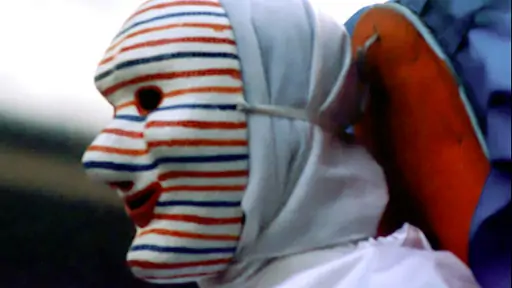Indigenous Calendar December, 2014: A Quichua Mask Explains Cultural Heritage

When T.S. Eliot wrote: "There will be time, there will be time/To prepare a face to meet the faces that you meet." (The Love Song of J. Alfred Prufrock, 1915) he was alluding to the notion that it is human nature to portray ourselves differently depending on the people around us. It has been argued by literary critics that Eliot is suggesting, figuratively at least, that our face is a mask. The same idea is found repeatedly in both data and theory in 20th Century social psychology literature.
For other famous literary characters the idea of the face as a mask is far from figurative. The enduring cultural popularity of characters such as The Phantom of the Opera, The Lone Ranger and Zorro attests to the social role of masks as universally identifiable: For each of these characters the mask was at least as important to the story as the man behind it.
Masks have played a role far older, richer and more universal than they do for any of these characters. In Ancient Greece theatre (in the broadest sense of performance art that included music, dance, drama and oration) was often performed by people who wore masks as part of their costume. This same theatrical device has continued to the present day. More recently the theatrical term dramatis personae (a Latin term with the theatrical meaning 'characters in the drama') has been associated with the playwright William Shakespeare. By extension modern anthropologists have adopted the term to refer to the characters involved in the ritualistic ceremonies enacted by many of the world's indigenous peoples. This is no coincidence. At the time of the Roman Empire the word persona (the Latin singular form of personae) vernacularly meant both 'person' in the sense of being a Roman Citizen and 'mask.'
Masks are a part of our cultural heritage. From depictions drawn on cave walls at the origin of our species to the tradition of Halloween to the avatars used in the most modern form of cultural interaction — the World Wide Web — we have always attempted to masquerade ourselves in various ways.
In many indigenous cultures though the mask has the oldest — and continues to have a most special — role: Their animistic belief systems often hold that the wearer of a mask literally becomes another spirit. I was in Ecuador observing a traditional ceremony of the Quichua people. Many of the performers in this ceremony wore masks of one kind or another. If we are to understand the Quichua people's animistic heritage we must believe that the person behind this mask has become another spirit. His role in the ritual is to drive evil spirits away. Few people would be inclined to believe that he could achieve this without the power derived from wearing his mask.
Read more about the Quichua people.
If you enjoyed reading this article, please consider supporting independent, advertising-free journalism by buying us a coffee to help us cover the cost of hosting our web site. Please click on the link or scan the QR code. Thanks!


